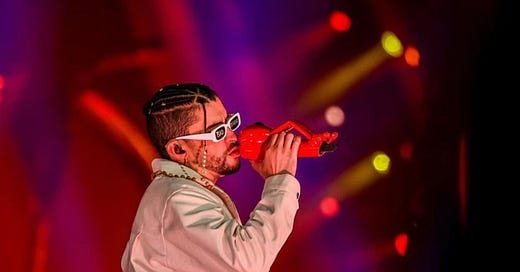Happy Monday everyone! And welcome to our fifth issue of Humber Views’ Game Changer series. Today we will be talking about Apple Music’s Artist of the year, three times in a row Spotify’s most-streamed artist in the world, 2022 Billboards #1 artist, and overall Latin music icon — Bad Bunny.
Listen to our podcast “4 a.m. perreo” with special guests Rojas and Gilbert Suarez from the group 6ix pal mundo. We chat about the evolution of reggaeton and what they, as new latin artist, think about Bad Bunny’s influence in the genre.
To learn more about Bad Bunny’s music career, awards and why he is considered a Game Changer in Latino America, read our story below.
Thank you for listening! Be sure to subscribe and check out more amazing Game Changers stories on Humber Views.
We hope you have as much fun reading and listening to our story as we had creating it!
— Maria and Enrique
Bad Bunny: Taking a new era of Latin music to the world
Benito Antonio Martínez Ocasio, better known as “Bad Bunny”, is a 28-year-old Latin singer and songwriter from Puerto Rico who has revolutionized Latin music — specifically the reggaeton genre.
Bad Bunny began his musical career in 2016 as part of the production company Hear This Music, an independent label that is under the control of Mambo Kingz and DJ Luian. With them, Bad Bunny released 50 songs in a two-year span. Many, if not all, of his songs from this time belong to the Latin trap genre, which is very similar to American rap in terms of the topics they discuss in the songs and the rhythm.
This genre stands out for its profound sexualization and objectification of women, openly discussing sex, drugs and having a lavish lifestyle. This was the type of music Bad Bunny started making, collaborating with other renowned Latin singers such as Ozuna, Farruko and Arcangel. Although these collaborations brought him a lot of fame, the music fell short of the Bad Bunny’s ideals for how he wanted people to experience and connect with his music.
In 2018, Bad Bunny parted ways with his record label, putting an end to limiting his ability to make decisions about his music, as the label decided the songs he would do and the artists with whom he would collaborate.
“I am no longer with Hear This Music — they never wanted me to release an album, they never allowed me, they never supported me,” said the artist during an Instagram Live.
With his new creative freedom, Bad Bunny began to experiment with his music, expanding his horizons of the urban genre and incorporating elements of other Latin American musical genres such as mambo and merengue into his songs. Later on, he began to use sounds from electronic music, pop, and even Latin rock.
Later in his career, taking advantage of the great international reach that his music had, Benito began to change the mindset of the genre with what is called “the new era.” It breaks with the stereotypes of toxic masculinity and the prejudice towards women commonly seen in reggaeton.
Benito began to take the concept of reggaeton to another level, giving his audience the opportunity to go from listening to songs that expressly talk about sex and women's bodies, to songs like “Andrea” where he highlights the virtues of women and defends their fight for freedom.
Or “Yo Perreo Sola” where he dresses as a woman from head to toe, wears makeup and sings about the independence and confidence of women.
The Puerto Rican is an artist who has slowly been leaving his mark by breaking down the barriers between musical genres in Latin America, giving artists like Drake and Cardi B the opportunity to experiment with reggaeton.
Some people could accurately say that reggaeton had evolved before, but Bad Bunny has achieved even greater recognition and is a true gamechanger for the genre. According to the Global Digital Artist Ranking study, he began 2022 as the most listened-to artist across all digital platforms such as Apple Music, YouTube, Deezer and Spotify. Ranking above international artists like Harry Styles and Ed Sheeran, he currently has over 62 million monthly listeners on Spotify.
His fame has led him to be part of the Super Bowl LIV halftime show with Shakira and J Lo and to win two Grammy Awards, four Latin Grammy Awards, eight Billboard Music Awards, an MTV Video Music Award, two American Music Awards, and thirteen Lo Nuestro Awards, among other accolades.
Benito uses his music and fame to raise awareness about the social and political problems of Puerto Rico, advocate for women, and to be an ally of the LGBTQ+ Community. By using his music to touch on topics never before discussed in reggaeton, Bad Bunny is a Latin music gamechanger in every sense of the word.
Related Reading
BBC|Spotify Wrapped: Bad Bunny tops most-streamed artists globally—BBC discusses Spotify Wrapped, Bad Bunny’s career and his many accomplishments as a Spanish speaker artist.
Democracy Now|Meet Puerto Rican Journalist Bianca Graulau, Featured in Viral Bad Bunny Video on Injustices in PR — Democracy Now talked to journalist Bianca Graulau about her participation in the documentary “People Live Here”, which appears in the music video for Bad Bunny’s El Apagón. Graulau talks in detail about the problems they wanted to represent with this documentary.
The Washington Post|For Bad Bunny’s fans, he’s more than a global superstar. He’s a political icon — This article from The Washington Post talks about the influence that Bad Bunny has on Latinos living abroad. Raising Latino pride and sharing Latin American social and political problems with the world.
About the authors
Maria Pimentel is a public relations coordinator, fourth-year journalism student and avid reader. Maria enjoys writing about arts as a form of social change and giving a voice to underrepresented communities. She is passionate about arts and books and looks forward to having a career as an entertainment reporter or book editor.
You can contact her by email (marilopimentel@gmail.com) Twitter or Instagram.
Enrique Domingo is a social media manager and a fourth-year Bachelor of Journalism student. He is a music and sports enthusiast, and when writing about these topics, he gives the perspective of unheard communities on broadly reported issues. Enrique aspires to have a career as a social media manager or a marketing director in sports-related companies.
You can contact him by email (enriquedomingomontrull@gmail.com) or Instagram.















Share this post